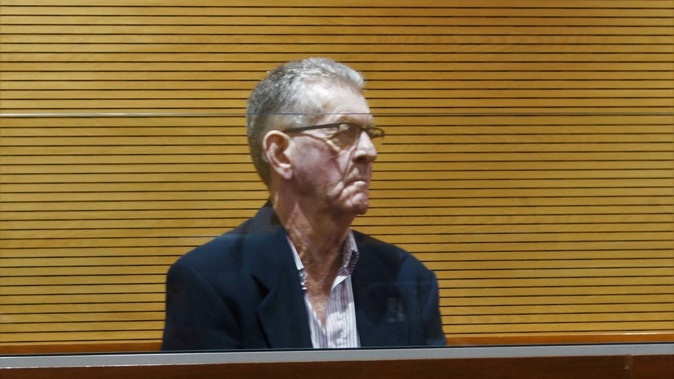

WARNING: This story details child sex abuse images and may be distressing.
A man who said his possession of child exploitation material was not sexually motivated but linked instead to the consequences of ill health can finally be named.
Christopher David Renwick was sentenced last month to 10 months of home detention after his arrest in late 2020 when police searched his home and seized electronic items which he had used to store and share objectionable images and videos.
The 68-year-old later admitted charges of child exploitation through twice distributing objectionable publications and 14 charges of knowingly possessing objectionable publications.
Some of the material depicted child rape involving very young children.
/cloudfront-ap-southeast-2.images.arcpublishing.com/nzme/NIOPOCLZ75AQTGUFCLKRF3RIHM.jpg) A judge has repeated comments that if people did not view, possess or share objectionable material there would be no market in the world for these acts to occur. Photo / 123rf
A judge has repeated comments that if people did not view, possess or share objectionable material there would be no market in the world for these acts to occur. Photo / 123rf
On October 7, 2020, Renwick was searching for images on a Russian-based free photo-sharing website.
He contacted another user on the site via email, after which the pair exchanged several more emails and talked about child exploitation material.
Two days later, the defendant emailed the other user two videos classified as objectionable.
On December 18, police searched Renwick’s home and arrested him.
He said at the time he had shared more than 1000 images and videos over four years, although the charges laid related to a shorter timeframe and less material.
Name suppression was lifted at sentencing last month, despite a concerted effort by Renwick to have it permanently suppressed.
An interim order was reinstated when he indicated he planned to appeal, despite the judge finding the consequences of naming him did not meet the threshold of extreme hardship to the man’s immediate and wider family.
Sentencing proceeded last month after several delays Judge Jo Rielly noted were linked to Renwick, but through no fault of his own so were therefore not considered aggravating features.
Judge Rielly reiterated comments made at recent sentencings involving similar offending that if people did not view, possess or share this material there would be no market in the world for these acts to occur.
Renwick’s lawyer Michael Vesty said he had since educated himself that the nature of the offending was wrong, and he had shown remorse and shame and was well aware there were true victims involved.
Crown prosecutor Jeremy Cameron acknowledged Renwick’s efforts towards rehabilitation but his “evolving empathy” toward the victims of his offending should not be used as a shield against acknowledging any sexual deviancy was involved.
He said it was “bold to assume it wasn’t associated with any paedophile interest” and that the material found was “child exploitation of the grossest kind”.
Vesty argued at sentencing that name suppression should continue because of the potential impact of publication on people connected to Renwick, and the downstream consequences on his family.
Vesty said the family was appalled and news of what had occurred had come as a “huge shock”.
“The most powerful reason for suppression is around the nature of who it would protect.
“They [family members] share the same surname, they live locally, including one who has the same name.”
Cameron said the test of extreme hardship was a “significant hurdle”, which was higher than the fear by family of embarrassment or concern that children would be bullied.
He said such consequences did not meet the legal test of extreme hardship and that the public interest over-rode the need for permanent suppression.
Cameron added the defendant had shown a certain “state of dissonance” between himself and the offending, in that he felt he was somehow different to others.
“I don’t think he should be able to differentiate as being of a different class,” Cameron said.
Judge Rielly acknowledged Renwick’s personal circumstances and background which had involved trauma that led to addictive behaviours, initially with substances and then engagement with child sex abuse material.
She noted Renwick’s reference to him suffering mental distress through being named and identified, and his concern over the impact on his wider family.
“I do however take into account the purported negative impact on the family who have the same surname.”
Judge Rielly also acknowledged the potential impact on younger members of Renwick’s wider family, including those still at school.
“I accept the submission that social media is powerful and that kids can be cruel and there is relevant evidence provided in support of this.”
However, she did not consider any of it grounds for continued name suppression.
Judge Rielly noted that family members had also indicated their willingness to offer continued daily support to Renwick, who they knew as having been an incredibly generous part of the wider family.
“Some of them have described their surprise and disgust, but they maintain their support for you,” Judge Rielly said.
-Tracy Neal, Open Justice
SEXUAL HARM
Where to get help:
If it's an emergency and you feel that you or someone else is at risk, call 111.
If you've ever experienced sexual assault or abuse and need to talk to someone, contact Safe to Talk confidentially, any time 24/7:
• Call 0800 044 334
• Text 4334
• Email [email protected]
• For more info or to web chat visit safetotalk.nz
Alternatively contact your local police station - click here for a list.
If you have been sexually assaulted, remember it's not your fault.

Take your Radio, Podcasts and Music with you









